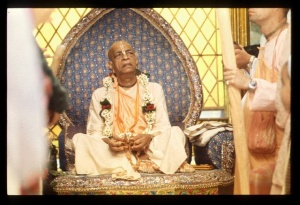SB 1.18.38: Difference between revisions
(Vanibot #0020: VersionCompareLinker - added a link to the Version Compare feature) |
(Vanibot #0054 edit - transform synonyms into clickable links, which search similar occurrences) |
||
| Line 24: | Line 24: | ||
<div class="synonyms"> | <div class="synonyms"> | ||
''tataḥ'' | ''[//vanipedia.org/wiki/Special:VaniSearch?s=tataḥ&tab=syno_o&ds=1 tataḥ]'' — thereafter; ''[//vanipedia.org/wiki/Special:VaniSearch?s=abhyetya&tab=syno_o&ds=1 abhyetya]'' — after entering into; ''[//vanipedia.org/wiki/Special:VaniSearch?s=āśramam&tab=syno_o&ds=1 āśramam]'' — the hermitage; ''[//vanipedia.org/wiki/Special:VaniSearch?s=bālaḥ&tab=syno_o&ds=1 bālaḥ]'' — boy; ''[//vanipedia.org/wiki/Special:VaniSearch?s=gale&tab=syno_o&ds=1 gale] [//vanipedia.org/wiki/Special:VaniSearch?s=sarpa&tab=syno_o&ds=1 sarpa]'' — the snake on the shoulder; ''[//vanipedia.org/wiki/Special:VaniSearch?s=kalevaram&tab=syno_o&ds=1 kalevaram]'' — body; ''[//vanipedia.org/wiki/Special:VaniSearch?s=pitaram&tab=syno_o&ds=1 pitaram]'' — unto the father; ''[//vanipedia.org/wiki/Special:VaniSearch?s=vīkṣya&tab=syno_o&ds=1 vīkṣya]'' — having seen; ''[//vanipedia.org/wiki/Special:VaniSearch?s=duḥkha&tab=syno_o&ds=1 duḥkha]-[//vanipedia.org/wiki/Special:VaniSearch?s=ārtaḥ&tab=syno_o&ds=1 ārtaḥ]'' — in a sorry plight; ''[//vanipedia.org/wiki/Special:VaniSearch?s=mukta&tab=syno_o&ds=1 mukta]-[//vanipedia.org/wiki/Special:VaniSearch?s=kaṇṭhaḥ&tab=syno_o&ds=1 kaṇṭhaḥ]'' — loudly; ''[//vanipedia.org/wiki/Special:VaniSearch?s=ruroda&tab=syno_o&ds=1 ruroda]'' — cried; ''[//vanipedia.org/wiki/Special:VaniSearch?s=ha&tab=syno_o&ds=1 ha]'' — in the past. | ||
</div> | </div> | ||
Latest revision as of 18:05, 17 February 2024

A.C. Bhaktivedanta Swami Prabhupada
TEXT 38
- tato 'bhyetyāśramaṁ bālo
- gale sarpa-kalevaram
- pitaraṁ vīkṣya duḥkhārto
- mukta-kaṇṭho ruroda ha
SYNONYMS
tataḥ — thereafter; abhyetya — after entering into; āśramam — the hermitage; bālaḥ — boy; gale sarpa — the snake on the shoulder; kalevaram — body; pitaram — unto the father; vīkṣya — having seen; duḥkha-ārtaḥ — in a sorry plight; mukta-kaṇṭhaḥ — loudly; ruroda — cried; ha — in the past.
TRANSLATION
Thereafter, when the boy returned to the hermitage, he saw a snake on his father's shoulder, and out of his grief he cried very loudly.
PURPORT
The boy was not happy because he committed a great mistake, and he wanted to be relieved of the burden on his heart by crying. So after entering the hermitage and seeing his father in that condition, he cried loudly so that he might be relieved. But it was too late. The father regretted the whole incident.